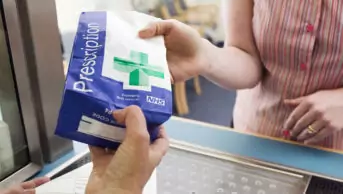Pharmacy technicians are increasingly being called on as the answer to the workload and workforce crises facing the pharmacy profession.
This month, in our feature revealing low rates of medicine reconciliations across trusts in England, Ruth Bednall, assistant director of quality improvement at University Hospitals of North Midlands NHS Trust, suggested that parts of the reconciliation process could be taken on by pharmacy technicians in future, freeing up pharmacists to spend more time on clinical activities.
This is exactly the direction of travel for pharmacists and pharmacy technicians, according to the government.
Speaking at a Health and Social Care Select Committee hearing on 26 March 2024, Amanda Doyle, national director for primary care and community services at NHS England, highlighted a vital role for pharmacy technicians in setting out the national body’s plans for the future of pharmacy.
“There are increasing numbers of pharmacy technicians both in clinical services in primary care or hospitals and in pharmacies themselves,” she told MPs. “We can free up the pharmacists to carry out a lot of the clinical service delivery that is part of our future strategy for the service.”
This strategy is reflected in the spate of pharmacy-focused government proposals that have been consulted on over the past six months, including proposals for pharmacy technicians to carry out “the preparation, assembly, dispensing, sale and supply of medicines” without the supervision of a pharmacist and plans for pharmacy technicians to administer and supply specified medicines under patient group directions (PGDs).
But these consultations on long-awaited advancements in pharmacy technicians’ professional responsibilities have given voice to concerns about their competency in these new roles.
Pharmacists have more power to delegate responsibilities to pharmacy technicians if they see fit, but it is not mandatory
In the same select committee hearing on 26 March 2024, Paulette Hamilton, Labour MP for Birmingham Erdington in the West Midlands, raised “concerns over the extent to which pharmacy technicians are being pushed into the frontline of pharmacy clinical practice”, comparing the use of pharmacy technicians to the use of physician associates.
“Pharmacy technicians are asked to do more and more, and may be doing more than they are qualified to do,” she said.
The concerns echo points made in a letter sent by the Pharmacists’ Defence Association (PDA) to pharmacy minister Andrea Leadsom and published on 26 March 2024. In the letter, the PDA argues that there are “cumulative risks to patient safety that are now starting to build over time because of the undeniable move towards allowing pharmacy staff to undertake activities which are inappropriate to their educational standard”. The PDA compares the requirement for pharmacy technicians to have a Level 3 National Vocational Qualification equivalent to one A level, with the requirements for pharmacists who “must have three A levels with high pass rates as a pre-condition of being admitted to a four-year university master’s degree”.
“Our concerns about the rapid role expansion for pharmacy technicians mirror those raised by the [British Medical Association] around the emergence of physician associate roles,” it adds.
In February 2024, results from a BMA survey showed that of 19,000 doctors, 87% said the way physician associates work in the NHS was always or sometimes a risk to patient safety, while nearly 80% said they were occasionally or frequently concerned that a physician associate they worked with was working beyond their competence.
Drawing a connection between pharmacy technicians and physician associates is a false equivalence. Their circumstances are only similar in that both professions are being considered for wider responsibilities despite generally reporting to another professional — either pharmacists or doctors, respectively.
As Andy Cowper, The Pharmaceutical Journal‘s health policy columnist, noted in September 2023, pharmacy technicians have been a recognisable UK profession since the 1950s, whereas the first physician associates were formally introduced in 2003. Pharmacy technicians are also subject to statutory regulation, unlike physician associates.
However, the crucial difference is the nature of the changes being proposed by the government. Extracting more work from physician associates will impose more time requirements on doctors to supervise them and maintain patient safety. This is not the case for pharmacy technicians. While their scope of practise is being expanded in law, it is still very much the pharmacists’ decision as to what additional work they take on.
Proposed changes to supervision legislation would give pharmacists more power to delegate responsibilities to pharmacy technicians if they see fit, but it is not mandatory that they do.
Similarly, each PGD will require sign-off from an authorised manager, confirming that the pharmacy technician is suitably trained to supply the specified medicine within a narrow set of circumstances.
As David Webb, chief pharmaceutical officer for England, said in respond to Hamilton’s concerns at the select committee hearing: “It is not about day one roles, but roles that someone develops into through a course of professional development, which can be undertaken at some point in the future when they have the necessary knowledge, skills and qualifications.”
To this end, NHS England opened a training course in consultation skills, clinical decision making and assessment skills for up to 840 pharmacy technicians in 2023.
Pharmacy technicians have routinely proven themselves to be an asset to the pharmacy team in a variety of ways from carrying out blood pressure checks to reducing errors in medicines administration and helping deliver more COVID-19 vaccinations, to name a few.
Expanding their role presents an ideal solution to growing pharmacist workload pressures, enabling pharmacists to develop their own role as independent prescribers in turn. PJ
1 comment
You must be logged in to post a comment.
You may also be interested in

A third of pharmacy technicians close to changing career, survey reveals

The contrast in reactions to growing roles for pharmacy technicians and physician associates


Why doesn’t RPS demonstrate leadership of this issue. Get APTUK and PDA together with pharmacists
and technicians who work well together to sort this out.
There are issues that need to be resolved such as over how technicians are kept up to date on pharmacy practice, laws and ethics and what gaps there may be in their knowledge that a Royal College could resolve through an accreditation system.
Pharmacists must remain responsible for standards of patient care and quality of medicines in a framework that maximises the use and skills of technical and assistant staff.